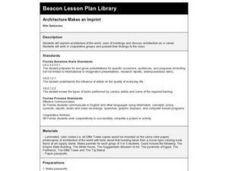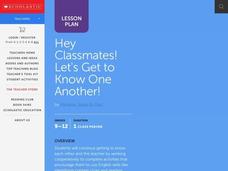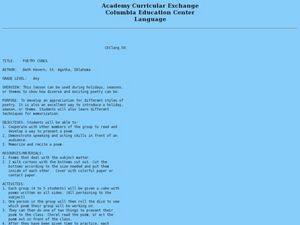2012 Teaching Resources
Analyzing Character Traits
Character analysis becomes easy with a 24-page packet packed with mini-lessons, graphic organizers, and activities. A must-have for your curriculum library.
Curated OER
What's for Dinner? (Using Adjectives)
Sixth graders use adjectives to describe foods listed in restaurant menus. In cooperative groups, 6th graders create menus and identify the adjectives used in the menu created by their group.
Curated OER
A Book a Day Will Keep the Teacher Away
Students work in cooperative groups to read a book in a day. Each group is assigned a portion of the book to read and uses the jigsaw learning strategy to review the book as a whole class.
Curated OER
Love and Friendship
Third graders do a hands-on activity after being read aloud the story of The Rag Coat, in cooperative groups.
Curated OER
Author's Purpose
Students discuss and define what folk and fairy tales are. In this literature lesson, students construct their own working definitions for folk and fairy tales. Students choose to work as a class or in cooperative groups. Then students...
Curated OER
Architecture Makes An Imprint
Fifth graders explore architecture of the world, uses of buildings and discuss architecture as a career. They work in cooperative groups and present their findings to the class. This lesson can be expanded to include a printmaking lesson.
Curated OER
What is an Animal Group?
Students discover that people live in groups and animals live in groups or alone. They list ways that families cooperate and work together as a group. They create a large dinosaur made out of geometric shapes.
Curated OER
THE LITTLE RED HEN - A TALE OF COOPERATION
Learners explore how much pleasure reading can bring, explain the concept of "story sequence", "re-tell" a story through art, and read other folktales.
Museum of Tolerance
Disenfranchised People of the New Nation
Why are some immigrant groups in the United States embraced while others become disenfranchised? To answer this question, teams investigate why groups emigrated to the US, why some of these these peoples were...
Rainforest Alliance
Investments in Forest Carbon
One hundred metric tons of CO2 can accumulate in one acre of forest over time—that's a lot of carbon! In the activity, groups of middle school learners determine what makes forests important. They then solidify the concept by using a...
ReadWriteThink
Biography Project: Research and Class Presentation
I Have A Dream ... that after the lesson, all individuals master the reading, writing, researching, listening, and speaking skills the biography project helps them develop. Martin Luther King, Jr. serves as a topic example for a model...
Curated OER
Founders of the Children's Rain Forest (Open Court)
Fifth graders read a narrative nonfiction piece describing the formation of the Students's Rain Forest organization from the SRA/McGraw-Hill Open Court Reading Anthology entitled, Cooperation and Competition. Founders of the Students's...
Curated OER
The Great Debate
Groups of learners investigate the persuasive genre of writing as they research and present on an issue. They research the Internet (possible websites are included) for a topic and locate information to present to the opposing team. In...
Curated OER
Stepping Into Careers
In this career lesson, students take a look at the qualities a person must possess in order to be considered a "cooperative person." Students make a record of daily activities showing responsibility at school and home for a one week...
Curated OER
Trivia Pursuit" To Review Material
Students play "Trivia Pursuit" in order to review material in any subject area. Groups are chosen to answer a given question, they discuss the answer and orally give it together.
Curated OER
Hey Classmates! Let's Get to Know One Another!
Two word puzzles encourage collaboration among learners. One sheet has numbers and initials that show a relationship and the other has pictorial images that represent a phrase. Partners cooperate in order to develop functional working...
Curated OER
Poetry Cubes
Reading aloud can be scary, but it's an important way to build oral fluency. Break the class into groups of four or five learners. Each learner will roll a cube to determine which poem they read aloud to their small group. Feel free to...
Curated OER
Effective Writing is More Than a Five Paragraph Essay
Groups become experts in one aspect of the six traits of writing, prepare a PowerPoint presentation, jigsaw, and teach others about their trait. Writers then focus on these traits as they compose a persuasive essay about a person they...
Curated OER
Kaffee - und Teegesellschaften: German Foods
Introduce your Language students to the culture and 19th century German custom of serving coffee and cake at small parties. They read old cookbooks, sort recipes, prepare foods, compare old German recipes to recipes from home and convert...
Curated OER
Acting Out Respect
Fifth graders explore, analyze and study interacting with others in ways that respect individual and group differences. They assess how to exhibit mutual respect and compromise in relationships through a teacher and counselor scenario...
Curated OER
Ivan the Fool: Lesson 3
Students read and analyze the Eastern European folktale of 'Ivan the Fool.' They discuss the term 'quest,' identify quests in their own lives, and in small groups design a board game that illustrates the czar's quest to find good wives...
Curated OER
Compare and Chart the Stories
Elementary schoolers engage in a literature study. They make comparisons of two different versions of a story using a graphic organizer. Using the text and pictures elementary schoolers investigate three elements from the story. Then,...
Curated OER
Irony in Poetry and Prose (Fiction and Non-fiction Texts)
Middle and high schoolers examine the impact of irony in poetry and prose. In this figurative language lesson, they read instructor-selected literature and identify uses of irony. Then they discuss how irony enhances literature.
Curated OER
Hidalgo's Fight for the Independence of Mexico
Tenth graders study and examine the life of Miguel Hidalgo while working to identify major themes. Small groups create sequence of event chains, analyze and label maps of Hidalgo's travels, and work together to create giant chalk maps...

























